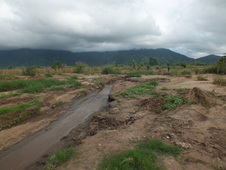
The WATERS-project is focused on ten Village Nature Resources Management Committees (VNRMC’s) in each district by training and supporting them in applying an Ecosystem Service Approach (ESAp). Al ten VNRMC’s will be linked together by a mutual threat and will have to work together to mitigate it. The VNRMC’s are registered committees who have a responsibility in their village on nature, agriculture and climate change. The climate change coordinators will support and train the VNRMC’s in different measures, for example:
- The planting of trees;
- on banks of rivers to prevent siltation;
- to prevent erosion and to slow down flashfloods;
- to make soil less vulnerable to dry spells;
- The prevention of deforestation by promoting of alternative energy sources ;
- The promotion of good agricultural methods with a variety of drought tolerant crops;
- Small scale irrigation;
- Usage of marches and wetlands for water storage
As example for the implementation of ESAp in the districts, we make use of the experiences and lessons learned at the Lake Chilwa Basin project in the east of Malawi. In this area the organization LEAD-SEA has been working with ESAp and VNRMC’s with success. To evaluate this project, a VSO-colleague of us, is placed at LEAD-SEA. He is providing us with much needed information on the practical implementation of ESAp. Another source of information is the Scottish James Hutton Institute. They will provide us with the theoretic knowledge about ecosystems and climate change during the whole project.
The four selected vulnerable districts in Malawi are Nsanje, Chikhwawa, Salima and Karonga. In each district VSO has placed 1 climate change coordinator. I’ll be working in Nsanje District in the southern tip of Malawi, the hottest and poorest district of Malawi. The top ten priorities in this district are:
1) Deforestation
2) Erosion
3) Siltation
4) Flooding
5) Dry spells
6) Water quality and quantity (salinity)
7) Forest fires
8) Poaching
9) Water catchment degradation
10) River bank cultivation
These priorities are causing or amplifying each other and other threats like flash floods, drought, the contamination of (drinking) water, water borne diseases (flooding), the wash away of crops and infrastructure, loss of biodiversity, and shortage of energy sources like fire wood.
My employer is the Council District of Nsanje. This is comparable with a Provincial Government in the Netherlands. Next to the practical implementation of the project we are also linking the Council District with the communities and NGO’s working on climate change related projects in the district and teaching about ecosystem and climate change on schools in the district.
Last but not least a volunteer from VSO is placed at the organization of CISONECC (Civil Society Network on Climate Change) in Malawi. She will organize the communication, promotion, media attention etc. of the WATERS project and the successes made.
The partners of the WATERS-project are:
· Voluntary Service Overseas (VSO);
· Ministry of Local Government and Rural Development (MLGRD);
· Centre for Environmental Policy and Advocacy (CEPA);
· LEAD Southern and Eastern Africa (LEAD-SEA);
· James Hutton Institute (JHI).
The whole project will run from February 2013 until March 2015. I will stay in Nsanje from February 2013 until February 2014. After this period another VSO volunteer will take over.


 RSS-feed
RSS-feed
